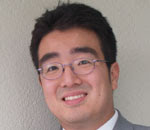Insights from Honeywell's IP Expert in India
Honeywell is a large and diverse manufacturing company that is primarily the 1999 merger product of US defense giant AlliedSignal and the well branded consumer products manufacturer that made products like home heating thermostats. Wikipedia describes the company as "a major American multinational conglomerate company that produces a variety of consumer products, engineering services, and aerospace systems for a wide variety of customers, from private consumers to major corporations."
Before joining HTSL last year, Suddha worked for Wipro, serving multiple Fortune 500 clients as an IT OEM specialist. He also hosted a radio show at Entertainment Network India which isn't something common to most engineers and IP experts.
Suddha was quite willing to share some things about himself, some trends to be mindful of, current examples of innovation successes in
Who were your early role models and what were the main things you learned from them?
When I was younger I thought that conceptualizing a scientific principle or manufacturing novel products with great lot of complex math behind them, are the most critical factors in determining the success or failure of that invention, little did I think about the usefulness of inventions which were never commercialized or inventions which never became an innovation, ( i.e. a new stuff which did not become popular to its end users en masse) In my high school days, my school teachers, various discovery channel science shows and the Indian IT boom of the 1990s, made me realize that consumer needs and /or wants when get satisfied in a product or service, creates an innovation. And that is not always necessarily related to difficult mathematical equations. As we all know great things are always simple in their concept.
What key trends do we need to be aware of?
When a highly experienced researcher or a veteran marketer who is an expert in his / her area or market, working for a big university or a multi billion dollar corporation, suddenly quits his/her job and creates or joins an obscure startup company; is an example when you should expect a trend to emerge in a small and niche technology / market gap. Mere patent numbers, financial or market research data don't give you any real trend. It's the people behind all those numbers who can show you the future of science, society and money!
What is an example of an innovative company in
Till date human civilization has showed us a model with industrial production, human migration for economic prosperity and proprietary knowledge owned by the wealth creators.
However, in the coming years a more socially committed innovative business model (but also with great profits after tax!) might be showcased by
How do you measure innovation success?
This could be measured if we notice, high market share with high profits, growing and varied product line and very less engineering or technology input costs. For Example; Google and Coca Cola, these two companies have the lowest budget for their global intellectual property protection needs. And as I previously mentioned innovations are not always inventions and thus are not necessarily measured by patent strength, patent activity or trade mark portfolio.
What is a biggest pitfall that impedes successful innovation?
For a knowledge intensive business, to impede a successful innovation, a lack of either or both the factors of, Organizational culture and individual mindset of each and every of all the employees, (and not only the VPs and the chairman,) matter the most. In such a situation, everyone stops thinking as being the primary beneficiary from an innovative product or service launched into the market by their company. This employee isolation is not good for innovation. All R&D employees should think of themselves as a scientist and also as a marketer, all at the same time. A less rigid job role / hierarchy help in achieving this impediment.
What advantages does Honeywell gain from having a major global R&D lab now based in
Indian engineers, scientists and managers who had previously lived in foreign countries for their jobs or education are usually happy to work from the Indian soil, while still being associated with an R&D giant like Honeywell.
Thank you Suddha for sharing these insights with us.
Labels: AlliedSignal, Honeywell, HTSL, innovation, intellectual property, IP, Suddha Basu




0 Comments:
Post a Comment
<< Home